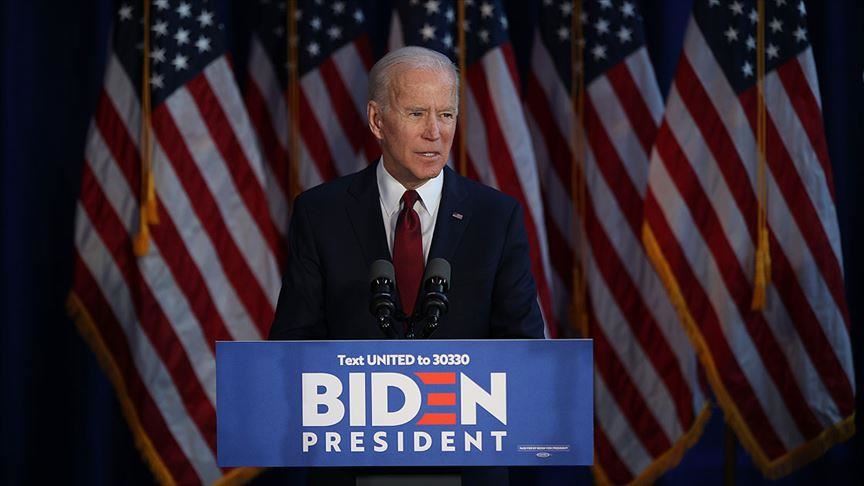
ANKARA
In a newly surfaced video, the current front-runner in the US presidential race said he would seek regime change in Turkey and declared to work with "opposition leadership" in the country to topple President Recep Tayyip Erdogan in Turkey’s 2023 elections.
While former Vice President Joe Biden and the Democratic Party have long accused Russia and other foreign powers like China and Iran of interfering in US elections – and accused President Donald Trump of collusion with these efforts – Biden’s remarks recorded last December seem to embrace the same tactics of interference in foreign elections, only this time for the US to try to sway elections in Turkey.
In the video, recorded last December for the FX documentary series The Weekly, Biden speaks with the New York Times editorial board, whose first foreign policy question to him incongruously does not concern such longtime adversaries as China, Russia, or Iran but rather NATO ally Turkey.
"Do you feel comfortable with the United States still having nuclear weapons in Turkey given Erdogan’s behavior?” Kathleen Kingsbury, the paper’s deputy editorial page editor, asked Biden.
Some 50 US nuclear weapons based in Turkey “began to stir public debate after Turkey’s offensive into Syria in October," she added, mischaracterizing Turkey’s Operation Peace Spring, launched last fall to prevent the formation of a terrorist corridor on its southern borders and to liberate local Syrians from terrorist oppression.
"The answer is my comfort level is diminished a great deal. I’ve spent a lot of time with Erdogan," Biden responded, describing Recep Tayyip Erdogan, Turkey’s democratically elected president, as an “autocrat.”
Biden added that if he is elected this November, his administration will pursue a policy of intervention against Turkey’s elected government.
"What I think we should be doing is taking a very different approach to him [Erdogan] now, making it clear that we support opposition leadership,” said Biden.
He added, suggesting an ultimatum: “He [Erdogan] has to pay a price. He has to pay a price for whether or not we’re going to continue to sell certain weapons to him."
During the two-term presidency of Barack Obama, whom Biden served as vice president, Turkey took strong exception to the US policies of financing and arming Turkey's terrorist archenemy in northern Syria, the YPG/PKK – whose mother terrorist group the PKK has taken some 40,000 lives – as well as to refusing to extradite Fetullah Gulen, the US resident leader of the terrorist Fetullah Gulen Terrorist Organization (FETO), which carried out a defeated coup attempt in July 2016.
Before the coup was defeated, the terror group FETO martyred 251 Turks and wounded more than 2,200 in less than 12 hours on the night of July 15.
Obama and Biden's failed Middle East policies, especially in Syria, also exacerbated relations with Turkey and set the stage for recent tension between the two NATO allies.
Anti-Turkish agenda
Lapsing into threats against a NATO partner, the 77-year-old presidential nominee continued to suggest interference, and showed a misunderstanding of Turkish politics.
Professing “concern,” Biden said: "I’m still of the view that if we were to engage more directly like I was doing with them, that we can support those elements of the Turkish leadership that still exist and get more from them and embolden them to be able to take on and defeat Erdogan. Not by a coup, not by a coup, but by the electoral process.”
Biden also stressed his unhappiness with Trump administration policies towards Turkey.
Trump “yielded” to Turkey, said Biden, adding: “And the last thing I would’ve done is yielded to him with regard to the Kurds. The absolute last thing." Biden’s remarks illicitly conflated “Kurds” with the terrorist YPG/PKK in northern Syria, a group which attacks Turkish security forces, kidnaps children – including many Kurds – and has tried to set up a terrorist statelet along Turkey’s borders.
He continued: "They got to understand that we’re not going to continue to play with them the way we have. So I am very concerned. I am very concerned.
“I’m very concerned about our airfields [at Incirlik Airbase in Adana, Turkey] and access to them as well.
“And I think it takes an awful lot of work for us to be able to get together with our allies in the region and deal with how we isolate his actions in the region, particularly in the Eastern Mediterranean in relating to oil and a whole range of other things which take too long to go into. But the answer is yes, I’m worried."
Biden's remarks flirting with hawkish US imperialism set off a firestorm of criticism from Turkey and across the world.
On the controversial remarks, Bruno Macaes, a senior fellow at the US-based Hudson Institute, said, "Biden knows nothing on Turkey" and that his misunderstanding of Turkish politics would earn "an F in a seminar."
The Turkish presidency and several opposition parties slammed Biden's remarks, stressing Turkey’s sovereignty and independence despite internal differences.
Biden’s remarks “reflect the games being played over Turkey and their interventionist attitudes," said Turkish Communications Director Fahrettin Altun on Twitter.
He added: “These remarks are not in line with democracy and the nature of Turkish-American relations.”








